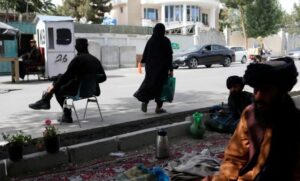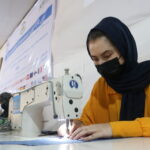Author: Mahdi Mozaffari
Recently, the Ministry of Justice of the caretaker government of Afghanistan prepared a text entitled “The law of commanding good and forbidding evil” and emphasized that the responsible forces in this field should apply those orders in the society. The Ministry of Justice announced that this text was prepared in four chapters and 37 articles based on Hanafi jurisprudence and Mullah Hebatullah Akhundzadeh, the leader of the current government, approved it as law. From now on, the Ministry of Prosperity and Prohibition will be responsible for the implementation of this law.
Considering that all the articles and clauses of this bill are related to the important issue of guidance and guidance of the society, it is necessary that religious experts and thinkers review it so that the correctness and incorrectness, purity and impurity of these specific laws and their consequences are clear to everyone. to be
This law deals with various issues in four chapters and 37 articles, including the behavior of men and women and even their most personal issues. However, in this law, many things such as human dignity, rights of individuals and respect for ethnic groups and religions are unfortunately ignored. Comprehensive review and detailed criticism of this bill requires a lot of time and courage. But the writer knows his human and Islamic duty to address at least one specific case of this law. In this summary, it only deals with those clauses and articles of the mentioned law that are in the field of women and their scope is the women’s society and the female section of the society.
In the thirteenth article of this law, which is related to women, it is stated: “Woman covering the whole body is mandatory”, “It is necessary to cover the face of a woman due to the fear of sedition”, “Women’s voices (singing songs, verses and reading aloud in Assembly) is awrat”, “Women’s clothes should not be thin, short and tight”, “Muslim women are obliged to hide their body and face from non-mahram men”, “Muslim and righteous women must cover themselves from infidel and immoral women for fear of sedition “, “It is forbidden for adult men to look at the body and face of women and for adult women to look at other men” and “Whenever an adult woman leaves her house for a necessary need, she is obliged to cover her voice, face and body ».
In this paragraph, all the behavior and habitation and even the pitch of the women’s voices have been discussed. All the women and the female society of Afghanistan will have their duties clarified and they will not have any injustice with the implementation and approval of this paragraph of the Law of Enjoining the Good and Prohibiting the Evil. The law has strongly and violently acknowledged that “a woman’s voice is private”; “It is haram to reveal a woman’s face”; “Being comfortable with women, even with their own kind, is against Sharia”; If a woman, God forbid, intends to go out of the house, no part of her body, even the positions of ablution (hands and face) and her voice, should be completely hidden and covered.
This brief footnote from the 13th paragraph of the Government Guidance Law is not a personal opinion, it is the real point of view and instructions that the leader of the government has ordered the officials to try to implement.
All these orders are according to Islamic Sharia (Hanafi jurisprudence) and it is what Islam has asked from those who command what is good and what is forbidden from what is bad. But should we also call all these materials and instructions Islamic with this claim of the government, without thinking and reflection? Just because the so-called Islamic government has sanctioned it! And after that, let’s make ourselves available to the enforcers of this law because we want to be real Muslims!
Common sense says that we should not consider it to be in accordance with the Prophetic Shari’a simply because some commandment or saying is labeled Islamic. At a time when the drumbeat of Islam and Sharia is heard from every village and village.
Therefore, the examination of the Law of Enjoining Good and Prohibiting Evil, especially its thirteenth paragraph, is one of the important and necessary tasks that must be done by Shariah scholars, jurists, and religious experts.
Article 13 of the State Guidance Law, contrary to its solid claim, is not completely in accordance with Muhammadan jurisprudence and Islamic literature.
First, it is well known among jurists, muftis and Shariah scholars that it is not necessary to cover completely so that the hands and face are not visible. The opinion and fatwa owners agree that there is no need to hide the positions of ablution (hands, wrists, and full face) from others. Ibn Qayyim Joziyeh, this famous Islamic jurist, pointed out in his works that it is not necessary to cover the positions of ablution under normal conditions.
Secondly, muftis always do not ignore the social side of women in issuing fatwas and rulings by adhering to the holy law of Islam, and it is not the case that the rulings issued by them bring weakness to women’s social life! However, the guidelines of the government consider the presence of women outside the house as against Islamic rules. From the time of the Prophet until now, women had cultural, social and even political activities side by side with men. It is evident in the history of Islam that even the Prophet’s wife and daughter were strongly in pursuit of social and political reform and they even recited ghaari sermons in the mosque for that purpose. In addition, women were the owners of teaching seats and sometimes they narrated hadiths. Only by examining these countless activities of Muslim women, the jurists of the present age do not allow themselves to limit the social life of women in order to force them from transformation and progressive spirit to passivity and stagnation.
Thirdly, the guidance literature of the law of commanding good and forbidding evil of the government is not according to the standards of commanding good and forbidding evil of the Prophet and religious elders. These laws are composed in a harsh tone and far from dignity and respect. This is the same sentence that says: “A woman’s voice is private.” It means that those who announce such laws are completely unaware of the spirit of mercy and education of Islam. Hazrat Rahmat al-Lalameen has never mentioned men or women as bad or ugly, on the contrary, he always mentioned men and women as good and beautiful.
#END













